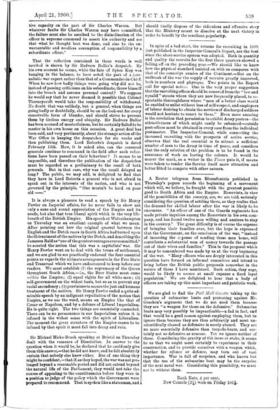That the reflection contained in these words is well merited
is shown by Sir Redvers Buller's despateh. By his own account he seems, while the fate of Spiou Rep was hanging in the balance, to have acted the part of a jour- nalistic war expert rather than that of a Commander-in-Chief. When he saw how badly things were going why did not he, instead of passing criticisms on his subordinate, throw himself into the breach and assume personal control ? We suppose he would say that he never deemed it possible that Colonel Thorneycroft would take the responsibility of withdrawal. No doubt that was unlikely, but a general, when things are going badly or doubtfully, should be on the look-out for every conceivable form of blunder, and should strive to prevent them by tireless energy and ubiquity. Sir Redvers Buller has been accused of masterfulness, but he certainly failed to be master in his own house on this occasion. A great deal has been said, and very pertinently, about the strange action of the War Office in keeping the despatches for six weeks and then publishing them. Lord Roberts's despatch is dated February 13th. How, it is asked also, can the censured generals continue to command in the field after such reflec- tions have been passed on their behaviour ? It seems to us impossible, and therefore the publication of the despatches must be regarded as a preliminary to the recall of both generals. But in that case, why was the recall delayed so long ? The public, we may add, is delighted to find that they have in Lord Roberts a general who is not afraid to speak out in the interests of the nation, and who is not governed by the principle, " One mustn't be hard on poor old —."


































 Previous page
Previous page